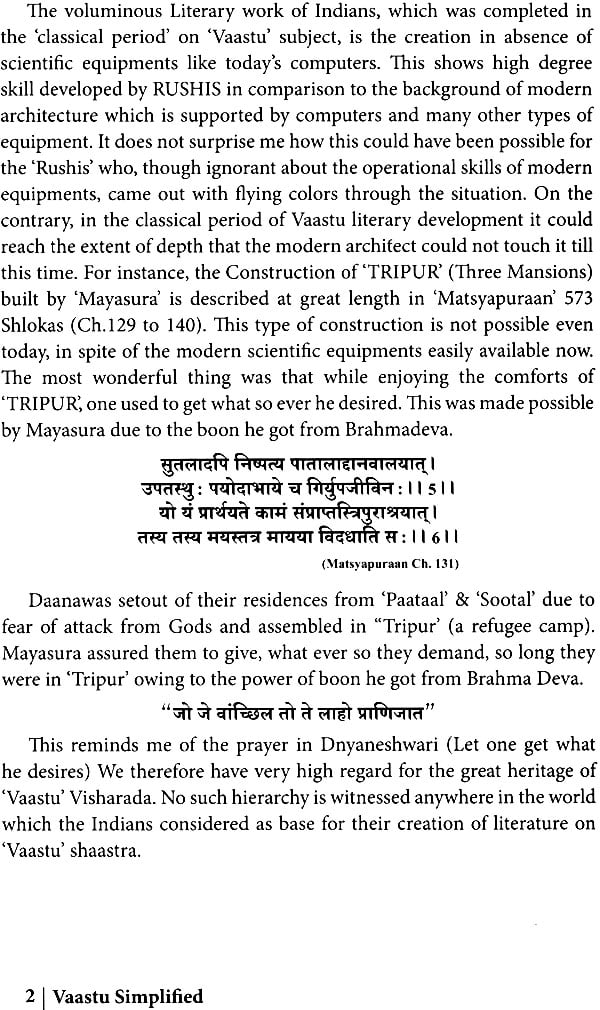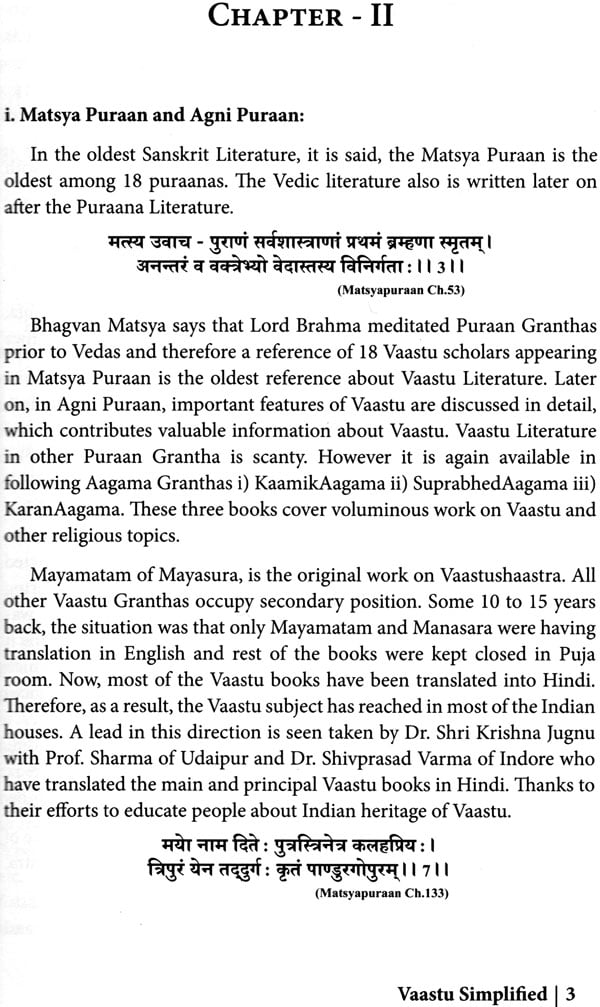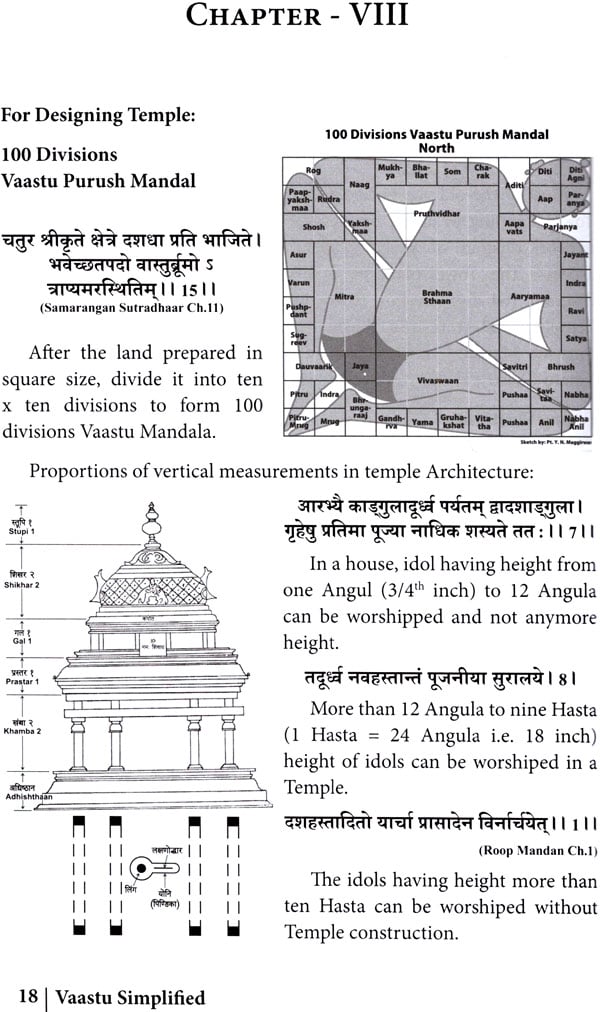
Vaastu Simplified
Book Specification
| Item Code: | NAO841 |
| Author: | Pt.Y.N. Maggirwar |
| Publisher: | SRI SRI PUBLICATION TRUST |
| Language: | Sanskrit Text With English Translation |
| Edition: | 2014 |
| ISBN: | 9789382146759 |
| Pages: | 126 (Throughout Color & B/W Illustrations) |
| Cover: | Paperback |
| Other Details | 8.5 inch X 5.5 inch |
| Weight | 190 gm |
Book Description
In this book the author has taken efforts to simplify the occult science of Vaastu in an excellent manner. He has explained the significiance of every Vaastu principle supported by Sanskrit sloka from classic Literature and has provided most accurate and appropriate sketches to explain the tricky situations.
A new theory of Dev Nakshatra and Yama Nakshatra creating impact zones of positive energy and negative energy respectively in the North Hemisphere and South Hemisphere of Earth and its connectivity with Vastu has opened a new chapter in the field to improve health and wealth condition. Quotions from "Taittareya Brahman" Cited support this dogma and indicate how the ancient Indian Philosocopy is deeply rooted in this field.
This book will help to understand the basic structure of Vaastu as contemplated by the authors of Mayamatam, Vishwakarma Vassushaastra, Manasaaram, Samaraagan Sutradhaar, Aparajit Pruchha etc.' since all the main features in the those books are compiled in "Vaastu Simplified". This book will prove to be a landmark approach in the field of Vaastu.
Background: It has been more than fifteen years that much water of river Ganga has gone to creek of Bengal since I came back to India from my sojourn to Europeon country Holland in 1995. In 1994, one book Vaastu named 'Mayamatam' was translated by the French Scholar named Mr. Bruno Dagence. Earlier to this, there was only one book titled 'Architecture of Manasaara' originally published in 1934. It went out of print and got reprinted in 1995.
Now, almost every old Vaastu text has been printed in Sanskrit or has been translated either in English or Hindi. Therefore, it has been possible for Indian Vaastu books to cross the boundary line of Indian Vaastu threshold. It was this background situation on Vaastu front before taking up the present book for writing.
The bottleneck: The concept of old classic Vaastu and the present day modern Vaastu is altogether different in their ideology. Therefore, without making it clear to both the parties the points of issues and solution to resolve them, it is difficult to go ahead with this subject.
Unless the basic rules of 'Municipal Building By –Laws' are amended to some extent to accommodate 'Vaastu, central portion i.e. 'Brahmasthaana' is the only open space margin in residential building as per Vaastu Building By –Laws. As such a discussion on this issue is required to decide whether we can have arrangements for Open Space Margin in the Outer periphery there may not be any objection from Muncnipal Corporation authorities for such arrangements, since it does not breach any rule of Building by Laws' of the Muncipal Corporations.
Further, it is to be understood that the open space margin as much is required to be left open, cannot be offered to leave open to the required extent as per Vaastu concept i.e. 1/9th part of the plot area. Because in thickly populated cities, it may not be possible to keep open space margins as required to be kept from outer periphery as per Muncipal Building by –laws. Therefore a smaller size of Brahmasthaana shall be acceptable to meet the pressure of fast growing cities. This has been the first step in forward direction by Vaastu stalwarts. Now, on the other hand, the municipal authorities shall come forward to extend support to Vaasthu concept by making it compulsory for the provision of 'Brahmasthaana.' This step from Mumbai Corporation may bring the Golden days of glorious past back to India.
This arrangement is workable only where Vaastu Rules can not be implemented in totally. However, efforts shall be continued to follow Vaastu Principles day by day on large scale to bring back the glorious past of India once again i.e. 'The feel good factor on increasing side.' In my efforts for search of the source of 'Feel Good Factor' one day an ancient took place. I was on my routine visit to Vaastu which was totally closed with a partition –well to divide the property. This location of partition –wall was the North side and it was totally closed without a gap, leaving no chance for a rays to percolate from that (North) side. East side also was closed like North Wall. As a result the health and wealth condition of this house (hotel) was deteriorating day by day. On this situation, I advised the owner to provide at least owner to provide at least one ventilator in the North wall at upper level so that the block created in the North side will get released to some extent. But the owner expressed his inability in complying with the corrective measure. Since the North wall being a partition wall, it may not have scope to disturb the privacy of others. As a desperate action, one day he drilled a hole into the North wall to the extent of ½" diameter GI pipe. A miracle took place and a turning point came to elevate luck factor of the land lord in whose house the point came to elevate luck factor of the land lord in whose house the trial bore was taken. This encouraged me to undertake more experiencing to allow inflow of North light and wind and similar provision to the East Direction. Wherever deep penetration of the North and East light and wind is available in ample stock, there I found no death of 'feel good factor'.
In present times Vastu Science has become very popular in India. The Architects and Engineers alike and tend to complete at least one course in traditional Vastu Shastra to Supplement their knowledge. Taking advantage of this popularity the market is replete with hundreds of books an Vastu Vidya. These books can be termed as hollow or highly substandard because now where in these books any genuine tradiotnal source is quoted from Shastra text to justify the contents. In the midst of this death of genuine and quality books on Vastu Vidya, the book entitled "Art of Living Vastu" is like a genuine oasis. The importance of this book is that the author has covered all the facts related to Vastu Shastra in 27, chapter spread over 134 pages. The book deals with the scientific and traditional approach towards Vastu Vidya. Now here the author deviates from quoting the original source from the time tested, original Vastu literature in Sanskrit. The principle of is followed in letter and spirit by the author.
The line says that "I will not write anything without quoting the original source and will not write anything which is out of context". This genious book on Vastu Shastra in English will be in great demand for Vastu Shastra curriculam. The present book "Art of Living Vastu" has fulfilled this great demand and has filled big void quality text. It will prove to be most genuine and useful reference books for the student and professionals of Vastu Vidya alike. The author Pt. Y.N. Maggirwar is a reputed scholar and a successfull professional in the area of Vastu Vidya. His knowledge regarding all the ancient text on Vastu Vidya is genuine, authentic, high level and interpreatative. He commands very high respect in the field of Traditional Indian Vastu Vidya. I am confident that this text entitled "Art of Living Vastu" will go a long way in establishing the importance and glory of traditional vastu and will arrest the proliferation of baseless and hollow books on vastu vidya. My congratulation to the author Pt. Y. N. Maggirwar. I extend my best wishes to him for the success of his genuine and missionary work on traditional Indian Vastu Vidhya.
| S.No. | Contents | Page No. |
| 1 | Hierarchy of Vastu Scholars | 1 |
| 2 | i. Mastya Puraan and Agni Puraan | 3 |
| ii. Vishwakarma and his work | ||
| iv. Maanasaara and his work | ||
| v. Maharaja Bhojdeo and his Samaraangan Sutradhaar | ||
| 3 | Birth story of Vaastu Purusha | 8 |
| 4 | Birth story of other texts | 10 |
| 5 | Vaastu Purusha Mandala 81 Division diagram for Residntial Bunglow Limbs of Vaastu Purusha | 11 |
| 6 | Vaastu Purusha Mandala Division with ref. to Nighantu | 13 |
| 7 | 64 Division diagram for Town Planning Facing position of Gods in village | 16 |
| 8 | 100 Division diagram for temple | 18 |
| 9 | Power fo Omnipresence / ubiquity | 19 |
| 10 | Vaastu adeversity (Prakop) in kaliyuga | 20 |
| 11 | Origin & Growth of Vaastu Shaastra | 21 |
| 12 | Awakahadaa Chakra in Vaastu making | 22 |
| 13 | Election of auspicious time for various stages of work (Muhurta) | 24 |
| 14 | Epic Legend of Shravan Kumar | 27 |
| 15 | Selection of Land -Critaria for selection of site | 29 |
| i. Nature of soil- Inherent & Exterior Conditions | ||
| ii. Shalya Jnaana | ||
| iii. Slope of Land | ||
| 16 | Typical types of Land | 35 |
| 17 | Orientation for houses of four classes | 38 |
| 18 | Six fold classification of Land Aaya, Vyaya, Nakshatra, Yoni, Vaara & Tithi | 40 |
| 19 | Shanku Sthaapana near Nabhi Sthaana | 43 |
| 20 | Planning and Designing of Bhavan | 46 |
| i. Sensitive Posittion of 81 Divisions Vaastu Purucha Mandala Orientation of 4 main directions & Chatushaala Vidhan | ||
| ii. Planning and Designing as per Kaamik Aagama | ||
| iii. Planning and Desiging as per Matsyapuraam, Agni-puram & Brahatsamhita | ||
| iv. Planning and Designing as per Mayamatam | ||
| V. Architectual of Maanasaara Farm House Plan and Comments | ||
| 21 | Components of 'Vaastu Purusha Mandala' | 54 |
| i. BrahmaSthana | ||
| ii. Paishach Bhaaga, Manushya Bhaaga | ||
| iii. Daiva Bhaaga, Brahma Bhagga, Shira, MarnaSthana | ||
| 22 | Laying of the First Brick/Stone | 58 |
| 23 | Gem Theraphy in foundation of Bhavan | 60 |
| i. As per Maanasaaram | ||
| ii. As per Mayamatam | ||
| iii. As per Aparajit pruchha | ||
| 24 | Placing ceremony of Main Door Frame | 64 |
| 25 | First Entry into House (Gruha Pravesh & Vaastu Shanti) | 68 |
| 26 | Panchashirsha Sthapanaa Point for placing 'Panchashirsha Golden Yantra' | 69 |
| 27 | Chitrakarma | 73 |
| 28 | Error in Construction | 74 |
| 29 | Technical Terms Ekashtipad, Vaastu, Vaastu Purusha, Mandala, Aja Shaala, Konashutra, Shula or Vedha, Koop Vedha, Purna Baahu, Hin Baahu, Pratyaksha, Alinda | 76 |
| 30 | Miscellaneous Vaastu Rules Precautionary Measure | 80 |
| 31 | Mars Yantra to get relief from loan liablity, Vaastu Devata & Durga Yantra | 92 |
| 32 | Rules for Tree Plantation | 94 |
| 33 | Names of Tree in different languages | 97 |
| 34 | Reference Books | 100 |











